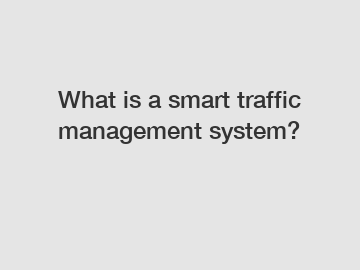What is a smart traffic management system?
Smart Traffic Management System: Revolutionizing Urban Transportation.
In today's fast-paced world, urban areas are facing a significant challenge in managing traffic congestion effectively. As cities continue to grow and more vehicles hit the road, traditional traffic management methods are proving to be insufficient. This is where smart traffic management systems come into play, offering a more efficient and sustainable solution to ease traffic congestion, improve road safety, and enhance overall transportation efficiency.
What is a Smart Traffic Management System?

A smart traffic management system is an advanced network of interconnected devices, sensors, and software applications that work together to monitor and control traffic flow in real-time. By leveraging technologies such as artificial intelligence, machine learning, and data analytics, these systems can collect, analyze, and act on traffic data to optimize traffic flow, reduce congestion, and enhance safety on the roads.
Sensors and Cameras: The Eyes of the System.
One of the key components of a smart traffic management system is the use of sensors and cameras installed throughout the city. These devices can detect vehicle movement, monitor traffic patterns, and capture real-time data on road conditions. By using this information, the system can identify traffic bottlenecks, accidents, or other incidents and respond accordingly to mitigate their impact on traffic flow.
Data Analytics: Turning Data into Actionable Insights.
Data analytics plays a crucial role in smart traffic management systems by processing and analyzing the vast amounts of data collected from sensors and cameras. By using algorithms and machine learning techniques, the system can identify traffic patterns, predict congestion hotspots, and suggest optimal routes for drivers to follow. This allows for proactive traffic management and helps prevent gridlock before it occurs.
Traffic Signals and Control Systems: Orchestrating Traffic Flow.
Another essential component of a smart traffic management system is the integration of intelligent traffic signals and control systems. These systems can adjust signal timings in real-time based on traffic conditions, prioritize emergency vehicles, or coordinate traffic flow across intersections to reduce delays and improve overall traffic efficiency. By dynamically adapting to changing traffic patterns, these systems can help optimize traffic flow and reduce the likelihood of congestion.
Benefits of Smart Traffic Management Systems.
The implementation of smart traffic management systems offers a wide array of benefits for urban areas and their residents. By reducing traffic congestion, these systems can help shorten commute times, lower fuel consumption, and decrease greenhouse gas emissions. Additionally, improved traffic flow can enhance road safety by reducing the likelihood of accidents and improving emergency response times.
Contact Us.
In conclusion, smart traffic management systems represent a significant advancement in urban transportation that has the potential to revolutionize how we manage traffic congestion and improve overall transportation efficiency. By leveraging cutting-edge technologies and real-time data analytics, these systems offer a proactive approach to traffic management that can help cities better cope with the challenges of growing urbanization. If you are interested in learning more about how a smart traffic management system can benefit your city or organization, please do not hesitate to contact us.
Contact us to discuss your requirements of vms traffic, variable message signs price, low power consumption led variable message sign. Our experienced sales team can help you identify the options that best suit your needs.

Comments
0